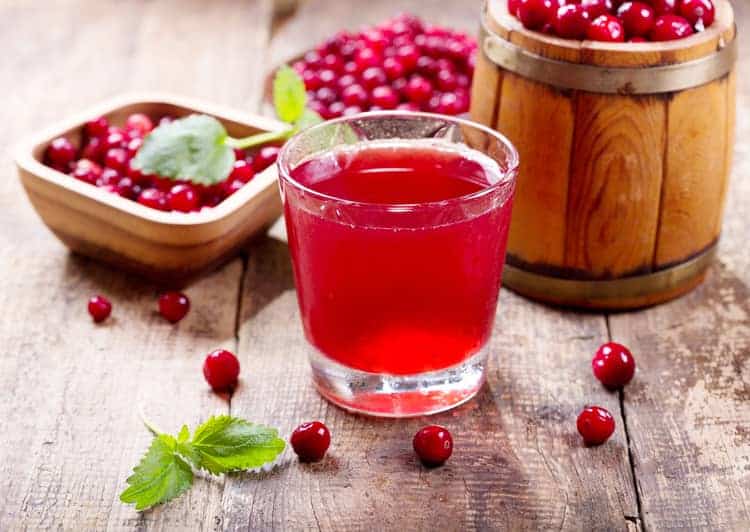
The liver is majorly important for detoxification and hormone production. And this means it should be one of the first things you look at when symptoms of hormonal imbalance start to creep up. So, in this article we’re going to look at liver health and hormone balance, diving specifically into:
- how the liver affects hormone balance.
- the surprising link between non-alcoholic fatty liver disease (NAFLD) and hormonal conditions.
- what you can do to detox and support your liver.
Note: this post contains some affiliate links and I earn a commission (at no additional cost to you) if you use them to make a purchase.
LIVER FUNCTION AND HORMONE IMBALANCE
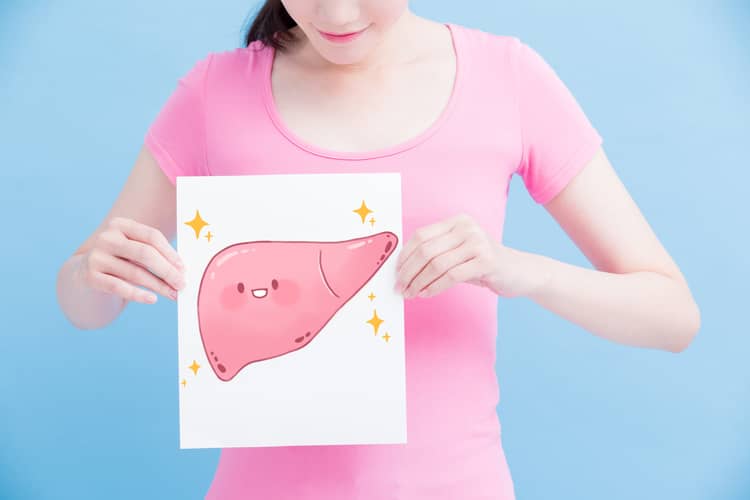
The liver is part of the digestive system and it has 500 different “jobs” that have been identified (so far). While the liver is most known for filtering blood, it does so much more than that. For example, the liver (source):
- Converts thyroid T4 hormone (which is inactive) to its active form, T3.
- Makes cholesterol, which is the main component of sex hormones and adrenal hormones.
- Converts glucose into glycogen. This glycogen is put into storage and can be used by the body as needed.
- Stores vitamins and minerals that the body can access as needed.
- Breaks down alcohol.
- Produces bile, a substance that is essential for breaking down fats.
- Breaks down harmful compounds (drugs, hormones, common toxins) into usable or less harmful forms. The by-products of this breakdown process are then pushed into bile (and subsequently eliminated through bowel movements) or blood (subsequently filtered by the kidneys and eliminated through urine).
That last piece – breaking down harmful compounds – is what we generally refer to as detoxification.
This process matters a lot for hormone balance because many of the chemicals that we’re exposed to are estrogen-based (xenoestrogens).
If function is somehow impaired and it can’t break down those chemicals as fast they they come into the body, this could contribute to:
- a buildup of toxins in the body.
- estrogen dominance as a result of having too many xenoestrogens in the body.
- inflammation, which then triggers more cortisol to be produced. All of this, will have a ripple effect on other hormones like insulin, progesterone and testosterone (just to name a few).
Furthermore, a sluggish or overworked liver also means that the process of breaking down our naturally produced hormones is also compromised.
FATTY LIVER DISEASE AND HORMONAL IMBALANCE (ESTROGEN, PROGESTERONE)
Non-alcoholic fatty liver disease (NAFLD) is the most common cause of liver disease in the West for people who drink little to no alcohol. And according to several studies, it tends to occur with hormonal imbalances. For example (1, 2, 3, 4, 5, 6):
- there’s an increased occurrence of NAFLD in women with PCOS. What’s more excess weight, insulin resistance and excess androgens – which are present in many, but not all PCOS patients – seem to be the things that contribute to the development of NAFLD in those patients.
- postmenopausal women tend to have a higher incidence of NAFLD, compared to premenopausal women. This may be partly due to the decreased levels of estrogen after menopause. You see, it turns out that estrogen has a regulatory effect on pathways and processes related to the liver. And that means if estrogen is too low, liver function could be negatively impacted.
- the use of synthetic hormones may also affect liver health. For example, estrogen therapy may improve NAFLD in postmenopausal women, while progesterone may have a pro-inflammatory effect.
- NAFLD has also been seen to occur in people with hypothyroidism, elevated cortisol and growth hormone deficiency.
As you can see, the language that is used when it comes to hormones and NAFLD has a lot of “maybe,” “link between,” and “tends to.” But there’s no clear agreement on whether hormonal imbalance causes fatty liver disease.
But one thing is clear: everything’s connected. So, we have to take a holistic approach with hormone balance, rather than only addressing symptoms.
HOW TO DO A LIVER DETOX FOR HORMONE BALANCE
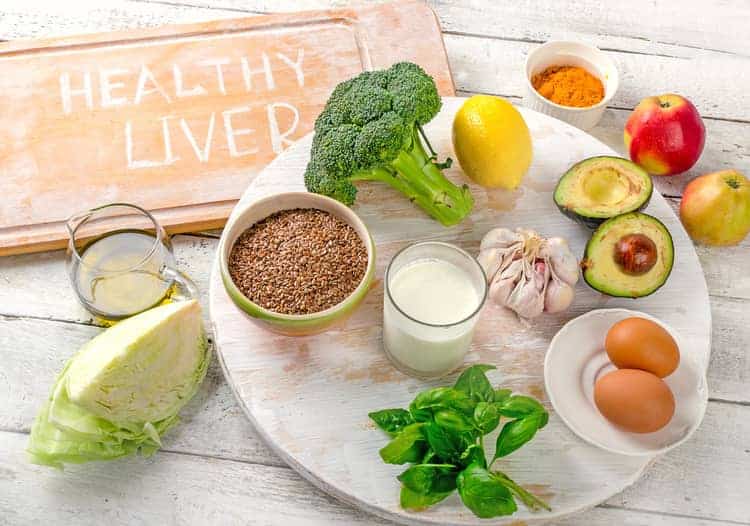
Very often when we think of doing a liver detox, we think of taking herbs like dandelion or milk thistle.
While these herbs are wonderful, we also want to make sure to make diet and lifestyle choices that reduce the amount of stress that is on the liver.
The 6 steps below will go a long way toward supporting your liver naturally, for long lasting results.
1. Eat plenty of nutrient-rich, whole foods
Since food is a very common source of toxins, it’s the best place to start when you want to improve liver function.
The goal here is very simple: consume more nutrient-dense, whole, unprocessed foods, particularly:
- fruits.
- veggies.
- grains.
- nuts.
- seeds.
This sounds too simple, but making this change gives your liver a chance to basically “take a breather.”
As things ease up for your liver, you will start to feel better too.
2. Add more bitter foods to your diet
One herbal tradition that has stood the test of time is the consumption of bitter foods for liver (and overall digestive) health.
Bitter compounds are amazing for stimulating the production and flow of bile!
And the good news is that there is a wide range of foods that contain bitter compounds. Some are extremely bitter while others are very mild and taste sweet (but they still contain the bitter compounds that the body responds to).
Now, here are some bitter foods and herbs that you can add to your diet:
| BITTER FOODS | artichokes bitter melon cacao powder citrus fruits cranberries cruciferous vegetables dandelion greens dark chocolate (70% or more) eggplant endives sesame seeds |
| BITTER HERBS | chamomile cloves dandelion fennel gentian green tea goldenrod licorice oregon grape root peppermint schisandra wormwood |
3. Minimize exposure to xenoestrogens
Aside from a lack of nutrients, one of the main things that can disrupt liver function is xenoestrogens.
These are foreign estrogens that mimic natural estrogen and as a result, interfere with normal estrogen function.
Some common sources of xenoestrogens are:
- Pesticides.
- Cosmetics and personal care products that contain ingredients like parabens or phthalates.
- Commercially raised meat and dairy products.
- Food additives.
- Tap water.
- Personal hygiene products like tampons (which release the byproduct dioxin).
- Food additives like MSG.
- Processed foods that use a lot of unfermented, soy-based additives.
The best way to minimize exposure to xenoestrogens? Follow these 7 basic guidelines:
- Eat more organic, non-GMO produce.
- Reduce the number of toxic cosmetics and personal care products you use. Whenever possible, buy from more natural-focused brands or make your own DIY products.
- Eat mainly wild-caught fish and game. When buying animal products, stick to organic, hormone-free and antibiotic-free varieties.
- Choose whole, homemade food over packaged/processed food.
- Use a water filter. Water quality varies wildly from one county to another, and one state to another. The filter than I’ve been using for the past 6 years is this one from ZeroWater. The carbon-based filtration system is – in my opinion – the best you can use (outside of installing a full reverse osmosis filtration system in your home).
- Buy tampons and pads made from organic cotton.
- Eat more fermented soy products (tempeh, miso, fermented soy sauce) and less unfermented soy products (like soy milk and tofu). Fermented soy seems to have less of an estrogenic effect.
4. Avoid alcohol
In small amounts, alcoholic drinks – like red wine – can provide some health benefits.
But long-term, excessive consumption of alcoholic drinks ultimately increases estrogen levels.
This is because the liver has to use up it stores of antioxidants, minerals and other nutrients to breakdown alcohol.
The more alcohol we consume, the more those liver stores are used up.
In the long run, the liver becomes nutrient-deficient (and so does the rest of the body).
Alcohol also disrupts blood sugar levels and this can worsen symptoms of hormone imbalance.
That’s because many women with hormone imbalance symptoms like PCOS tend to have insulin resistance.
So it’s best to avoid alcohol as much as possible if you want achieve a state of natural hormone balance.
5. Find ways to minimize (and manage) stress
Stress is unavoidable, but we can take control of how we respond to it.
Now, you may be wondering “why does stress matter when it comes to my liver?”
The simply answer is that when you are stressed, blood flow to the liver reduces.
With less blood supply, the liver is not able to perform all of its functions optimally. This produces various negative effects for our hormones.
In addition, when the body is faced with stress, higher quantities of the stress hormone, cortisol, are released.
Now, this is where things get interesting!
Cortisol and progesterone are made from the same main hormone (pregnenolone).
This means whenever the body needs to make more cortisol, it will make less progesterone.
This is all good and well when we’re talking about short-term stress.
However, when we’re faced with long-term stress, that means we are permanently sacrificing progesterone production.
Ultimately, this sets us up for estrogen dominance!
So, it’s important to make lifestyle choices that reduce the impact of stress in our lives.
This means performing activities you enjoy (like walking, dancing, gardening, journaling, etc.). This also means surrounding yourself with people who bring out the best in you and prioritizing balance in all aspects of your life!
NOTE: according to traditional Chinese medicine, anger is stored in the liver. So, part of detoxing the liver involves working through anger and the stress that it adds to your life 🙂
6. Take a slow and steady approach to detoxing
A liver detox doesn’t have to be extreme. Meaning you don’t have to restrict yourself in terms of calories, drink only juice or cut out carbs (other food groups).
Remember your body needs all nutrients. So, give yourself time – at least 28 days – to make the necessary dietary changes and to evaluate how your body responds.
While doing your detox, you can use the supplements below to further nourish and support the liver:
- Multi-herb liver tincture: it combines several amazing herbs and foods that we’re already talked about such as dandelion, milk thistle, artichokes, schisandra and oregon grape root.
- Everyday Dandelion Detox tea: it contains dandelion, fennel, peppermint and licorice.
That’s it! Just follow the manufacturer’s instructions for how to use the tincture and tea.
CONCLUSION
As you implement the tips we’ve covered in this article, pay attention to the shifts that start to occur in your body, whether big or small.
In addition to the tips in this article, remember that your liver is influenced your entire diet.
So, have a look at some of the other tips here to help you build a diet that supports you holistically.
Related Posts:
3 Supplements For Female Hormonal Imbalance (you probably don’t know about)
Symptoms of Estrogen Dominance and How to Correct It
6 Herbs That Balance Hormones (That You’re Probably Not Using)
Smoothies For Hormone Balance: Top Tips & Recipes To Use Today
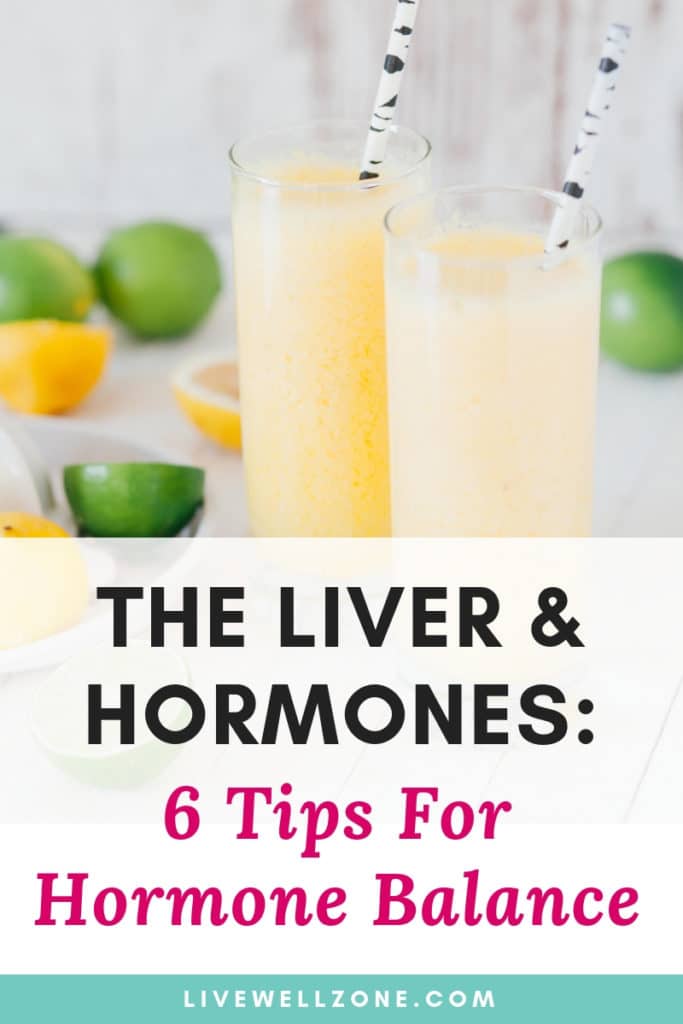
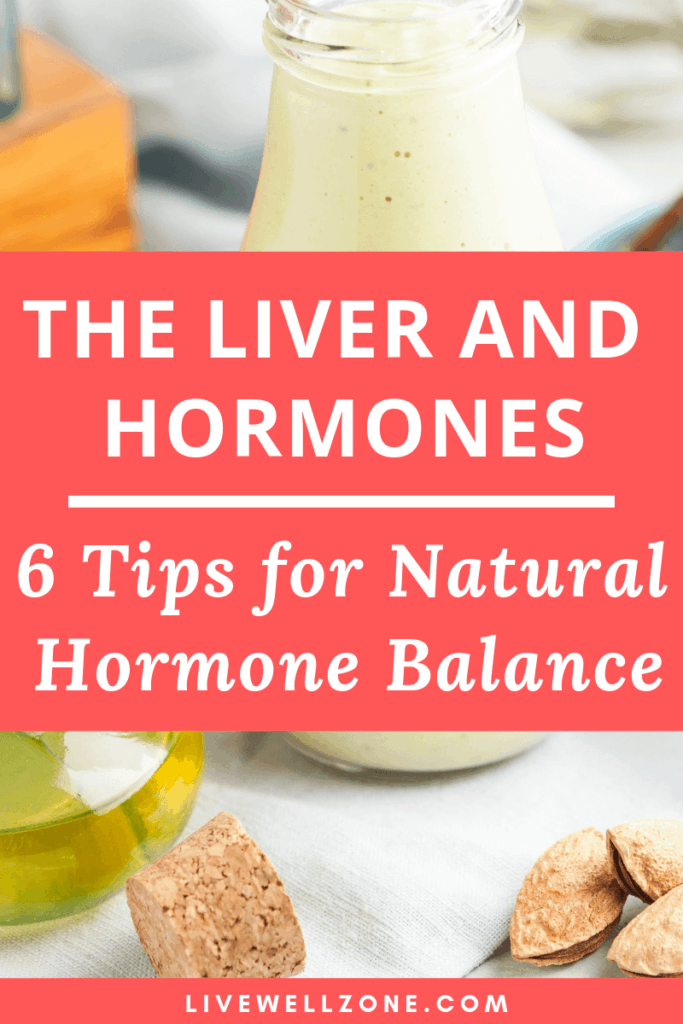



Comment I find this information vital.thanks Germain.
Thank you Rosette. Glad it’s helpful!
Regarding the liver detox, are you fasting along with these supplements? Or is it okay to eat? Does it matter?
Hi Jennifer, no fasting for this. I just focus on eating clean during that time. A mix of raw and cooked food, and no animal products.
Thank you so much!
You’re very welcome 🙂
I have found that green tea in moderation is good for liver detox, but green tea extract as found in energy drinks, pre-workouts and fat burners can actually damage your liver!
Totally agree Kelly. I always stick with regular green tea for a liver detox. Extracts are not my favorite thing and there are far too many on the market. They are concentrates and lack all of the other good stuff that is in the whole food.
Hi, would you consider tuna as an animal product? Or is it ok to eat during detox? And are eggs ok?
Yes tuna fish are animals. Fish and eggs can be consumed during a detox, depending on the length of the detox. And it has to be eaten sparingly, and top quality (to avoid the usual toxins).
Thanks for the info,quite helpful…How do we know the green teas that are ok to take
Hi there, just buy regular green tea leaves and make tea the old fashioned way. That’s the best way to be sure.
Hi, im having a thyroid problem and taking medication for 7 months now , my question is, can I do a liver detox? If it’s yes how is it the right way and with medication or not? Thanks
Since you’re on medication, please check with your doctor about how the drugs and a detox interact together.
Great article, thank you. A lot of resourceful information.
Glad you liked it and thank you! 🙂